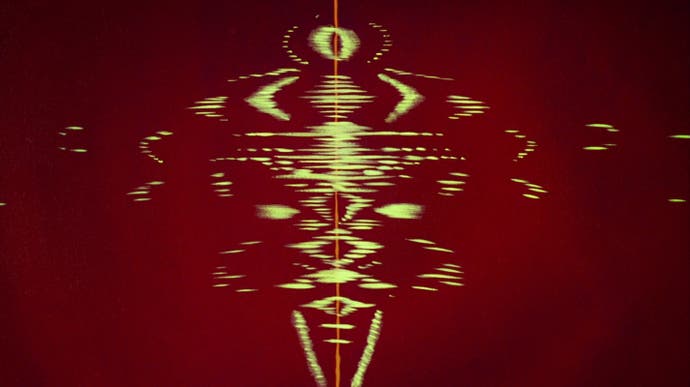Someone should make a game about: Lhermitte's sign
BRAAANNNG!
There's a fascinating moment in Disney's Fantasia where Deems Taylor invites the soundtrack onto the centre stage. This is the flickering line that carries the movie's audio, and with Disney's animators in charge it starts to ripple and splatter as music rushes through it. Spirograph curls and lily pads drifting across the surfaces of ponds, writing their own wakes. And then it's over and back to the main event.
I haven't seen Fantasia in about 30 years, but I still think of that moment every time I bend my head forward, which is quite often, all things considered. When I bend my head forward, I get a blast of energy rushing down my spine. It's a friendly thing for me, a warm jolt, but as it burns out in my ankles, I almost see that dispersing, collapsing wave rush of the Fantasia soundtrack. It's a symptom - in my case of a lesion on the spine, highly indicative of multiple sclerosis - but it's almost a musical instrument. I can bend my head forward and back, and I swear the rush of electricity responds to this, as if I'm moving my fingers over cello strings, or sculpting the thick, mineral air around a Theremin.
Invisible and ever-present, this is one of the private, wordless travelling companions of neurological disease. The sensation is sometimes known as Barber's Chair Syndrome, because you trigger it by moving your head forward, your chin towards your chest. But its proper name is Lhermitte's sign. For years I was fascinated by this name because in its careful, studied wrongness, it seemed emblematic of so much of the dazzling, disconcerting, tricksy world of neurology. Wrong because Jean Lhermitte was not the first to discover it, and not even the first to properly describe it. Doubly wrong - I still don't understand how this bit stuck - because it's not a sign but rather a symptom. A sign would be observable to people other than me. That's my understanding anyway.
When Lhermitte's first went off in me, I don't think I can adequately describe how terrifying it was. It was the most vivid, violent thing that had ever occurred inside me, a corrugated roar, an electrical tyre tread, total-organ-revving. The very first explosion of Lhermitte's actually made me laugh out loud in pure shock. Now it's just a friendly part of the world around me, which means, as often as not for a neurological patient, the world inside me.
I thought of Lhermitte's during our recent Music Week, and I suddenly saw it in a new way. Probably an evolution of the Fantasia soundtrack thing. Lhermitte's is silent, but it never feels silent. In its movement it can be a horn blast or a rush of metallic strings. I can think of it, maybe, as a bolt of noise interrupting the quiet burbly music of homeostasis. It makes me think of games and the body - games that explore the body.
There are plenty of these games, because the body is decent IP: everyone is familiar with it, great brand awareness, and nobody is going to issue you with a copyright strike. But inside, so much untapped terrain. For years I wondered about a racing game zinging along neurons and stunt-jumping across synapses in perfume bursts - for all I know one exists. Platformers in the roguelike spaces of the lungs, strategy games as you get the organs working together but separately.
But what about music? Luria said the body is "a unity of action", which is something all game designers and all composers would probably understand. In truth, the body is clearly a rhythm game, even before Lhermitte's sign signals there's a problem somewhere. The burbling of the stomach, the beating of the heart. We are an orchestra. And it would be fascinating to have to conduct this orchestra, and to understand what rogue players like Lhermitte's were getting at in the brass section.
The benefits of such a game? A proper engagement with the universe inside us. And what a strange universe it is. One last memory: a few years back, I was talking to a neurology registrar about a ticking, clicking sound that had started in my head and played whenever I moved my eyes. Maybe it was a rushing sound, very brisk. I called it the wince. What's that all about? I asked. The registrar thought for a while and offered a guess. The brain, she told me, actually makes quite a lot of noise. Blood flow and all that - I gather that at any moment a surprising amount of the body's blood supply is dashing through this strange ugly-beautiful organ. Very quickly in our lives, the brain silences itself to us, though: it dials its own noises down, so we can focus on other things. But sometimes when things go wrong, we get to hear it again. Sometimes, the soundtrack moves from the polite corner of the screen to centre-stage.










